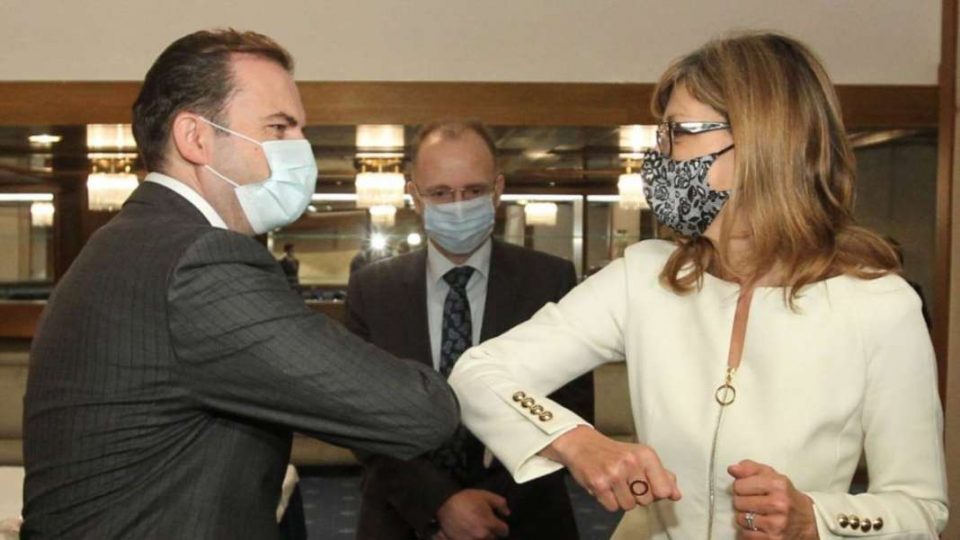German ORF has published the text of the agreement reached between Macedonian and Bulgarian diplomats in Berlin last week, that was supposed to help Bulgaria open the EU accession talks with Macedonia. But shortly after the meeting, facilitated by German Foreign Minister Heiko Maas and his deputy Michael Roth, Bulgaria withdrew from the agreement.
The paper states that Bulgaria will support Macedonia’s EU accession. “In this spirit, BGR confirms its readiness to agree to the negotiations framework EU – MKD and to holding the first Intergovernmental Conference in December 2020 during the German Presidency of the Council of the European Union”. In exchange, it receives a relatively light concession – Macedonia is asked to “declare officially that the Macedonian language has been codified in 1945”, which is a fact, although the language of course has a much older genesis. Bulgaria insists that it has derived from the Bulgarian language, and its position would be noted by the Council.
Macedonia is also asked to renounce any territorial claims on Bulgaria, which it has done frequently, by stating that the imposed name “North Macedonia” refers only on the… “Republic of North Macedonia”, and not as Bulgaria sometimes fears to its own province of Blagoevgrad or Pirin Macedonia.
Macedonia is also required to recommit to fighting “incitement of violence and hatred”, which Bulgaria defines as promoting the minority rights of Macedonians in Bulgaria: “BGR and MKD will officially reconfirm Art.11 of the Treaty of Friendship, Good Neighbourliness and Cooperation, including minority issues, and recommit to undertake efficient measures to prevent ill- intentioned propaganda by institutions and agencies and to discourage activities of private entities aimed at inciting violence, hatred and other similar activities that may be detrimental to their relations”.
This was verbally agreed between Macedonian diplomats Nikola Dimitrov and Bujar Osmani, and Bulgarian Foreign Minister Ekaterina Zaharieva. But upon Zaharieva’s return to Sofia, Prime Minister Boyko Borisov and President Rumen Radev promptly rejected it as insufficient, and Bulgaria then blocked the opening of accession talks. Next attempt to thaw the relations comes tomorrow, with the Sofia summit of the Berlin process, which is being co-organized by Macedonia and Bulgaria and was supposed to be a major show of unity and cooperation, but instead marks a low point in relations between the two countries.
Full text, as published by ORF journalist Christian Wehrschuetz:
Non-Paper:
1. BGR, MKD and DEU underline their joint commitment to the EU perspective of the Western Balkans and to a credible EU enlargement policy as well as to intensifying regional cooperation, all of which is crucial for the stability of the region.
2. In this spirit, BGR confirms its readiness to agree to the negotiations framework EU – MKD and to holding the first Intergovernmental Conference in December 2020 during the German Presidency of the Council of the European Union.
3. On the occasion of the first Intergovernmental Conference, MKD will declare officially towards EU Member States and Institutions that the short form of its state name – North Macedonia – refers solely to the political entity “Republic of North Macedonia”.
4. BGR reserves the right, in an unilateral statement to be annexed to the negotiation framework, to declare that when referring to the Macedonian language it understands the Macedonian language in accordance with the Constitution of the Republic of North Macedonia. The DEU Presidency will ask the Council to take official note of the position of BGR that when referring to the Macedonian language it is to be considered in accordance with the Constitution of the Republic of North Macedonia. MKD is ready to declare officially that the Macedonian language has been codified in 1945.
5. BGR and MKD confirm their willingness to intensify their close bilateral cooperation on the basis of the Treaty of Friendship, Good Neighbourliness and Cooperation, with a special focus on the work of the Joint Multidisciplinary Expert Commission for Historical and Education Issues, which should be intensified and made more transparent including by publishing the results achieved. DEU declares its readiness to support the work of the Commission by sharing best–practices on working methods.
6. BGR and MKD will officially reconfirm Art.11 of the Treaty of Friendship, Good Neighbourliness and Cooperation, including minority issues, and recommit to undertake efficient measures to prevent ill- intentioned propaganda by institutions and agencies and to discourage activities of private entities aimed at inciting violence, hatred and other similar activities that may be detrimental to their relations.
7. BGR, MKD and DEU stress the importance of connectivity and infrastructure, especially the rail and road connection running from Durres via Skopje to Sofia and Varna. They will support prioritization of Corridor VIII in the framework of the EU Commission’s Economic and Investment Plan for the Western Balkans.
8. BGR and MKD agree on the importance of fostering good – neighbourly relations on all levels, including via youth exchange, and are considering to kick off a joint youth exchange project, while jointly examining further possible areas for the cooperation to foster mutual understanding and intensify bilateral contacts, including media exchange projects and town twinnings.
9. BGR, MKD and DEU remain concerned about the grave situation caused by pandemic, stress that close cooperation between neighbours within the EU and of the EU with the Western Balkan countries is crucial to jointly overcome the crisis which puts at risk our prosperity, social cohesion and stability.





Comments are closed for this post.